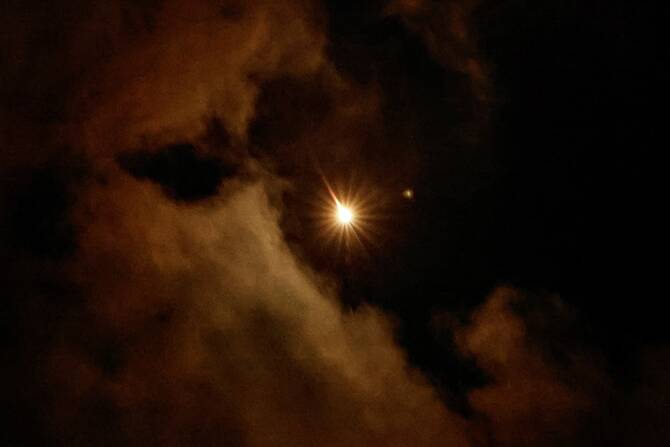JERUSALEM/WASHINGTON/DUBAI: Iran and Israel launched new missile strikes at each other on Wednesday as the air war between the two longtime enemies entered a sixth day despite a call from US President Donald Trump for Iran’s unconditional surrender.
The Israeli military said two barrages of Iranian missiles were launched toward Israel in the first two hours of Wednesday morning. Explosions were heard over Tel Aviv.
Israel told residents in the area of Tehran to evacuate so its air force could strike Iranian military installations. Iranian news websites said explosions were heard in Tehran and the city of Karaj west of the capital.
Trump warned on social media on Tuesday that US patience was wearing thin. While he said there was no intention to kill Iran’s leader “for now,” his comments suggested a more aggressive stance toward Iran as he weighs whether to deepen US involvement.
“We know exactly where the so-called ‘Supreme Leader’ is hiding,” he wrote on Truth Social, referring to Iran’s Ayatollah Ali Khamenei. “We are not going to take him out , at least not for now … Our patience is wearing thin.”
Three minutes later Trump posted, “UNCONDITIONAL SURRENDER!“
A White House official said Trump spoke to Israeli Prime Minister Benjamin Netanyahu by phone on Tuesday.
Trump’s sometimes contradictory and cryptic messaging about the conflict between close US ally Israel and longtime foe Iran has deepened the uncertainty surrounding the crisis. His public comments have ranged from military threats to diplomatic overtures, not uncommon for a president known for an often erratic approach to foreign policy.
Britain’s leader Keir Starmer, speaking at the Group of Seven nations summit in Canada that Trump left early, said there was no indication the US was about to enter the conflict.
Trump met for 90 minutes with his National Security Council on Tuesday afternoon to discuss the conflict, a White House official said. Details were not immediately available.
The US is deploying more fighter aircraft to the Middle East and extending the deployment of other warplanes, three US officials told Reuters. The US has so far only taken defensive actions in the current conflict with Iran, including helping to shoot down missiles fired toward Israel.
Regional influence weakens
Khamenei’s main military and security advisers have been killed by Israeli strikes, hollowing out his inner circle and raising the risk of strategic errors, according to five people familiar with his decision-making process.
With Iranian leaders suffering their most dangerous security breach since the 1979 Islamic Revolution, the country’s cybersecurity command banned officials from using communications devices and mobile phones, Fars news agency reported.
Israel launched a “massive cyber war” against Iran’s digital infrastructure, Iranian media reported.
Ever since Iran-backed Hamas attacked Israel on October 7, 2023, and triggered the Gaza war, Khamenei’s regional influence has waned as Israel has pounded Iran’s proxies — from Hamas in Gaza to Hezbollah in Lebanon, the Houthis in Yemen and militias in Iraq. Iran’s close ally, Syria’s autocratic president Bashar Assad, has been ousted.
Israel launched its air war, its largest ever on Iran, on Friday after saying it had concluded the Islamic Republic was on the verge of developing a nuclear weapon.
Iran denies seeking nuclear weapons and has pointed to its right to nuclear technology for peaceful purposes, including enrichment, as a party to the international Non-Proliferation Treaty.
Israel, which is not a party to the NPT, is the only country in the Middle East believed to have nuclear weapons. Israel does not deny or confirm that.
Netanyahu has stressed that he will not back down until Iran’s nuclear development is disabled, while Trump says the Israeli assault could end if Iran agrees to strict curbs on enrichment.
Before Israel’s attack began, the 35-nation board of governors of the UN nuclear watchdog, the International Atomic Energy Agency, declared Iran in breach of its non-proliferation obligations for the first time in almost 20 years.
The IAEA said on Tuesday an Israeli strike directly hit the underground enrichment halls at the Natanz facility.
Israel says it now has control of Iranian airspace and intends to escalate the campaign in coming days.
But Israel will struggle to deal a knock-out blow to deeply buried nuclear sites like Fordow, which is dug beneath a mountain, without the US joining the attack.
Iranian officials have reported 224 deaths, mostly civilians, while Israel said 24 civilians had been killed. Residents of both countries have been evacuated or fled.
Global oil markets are on high alert following strikes on sites including the world’s biggest gas field, South Pars, shared by Iran and Qatar.
Reuters




















